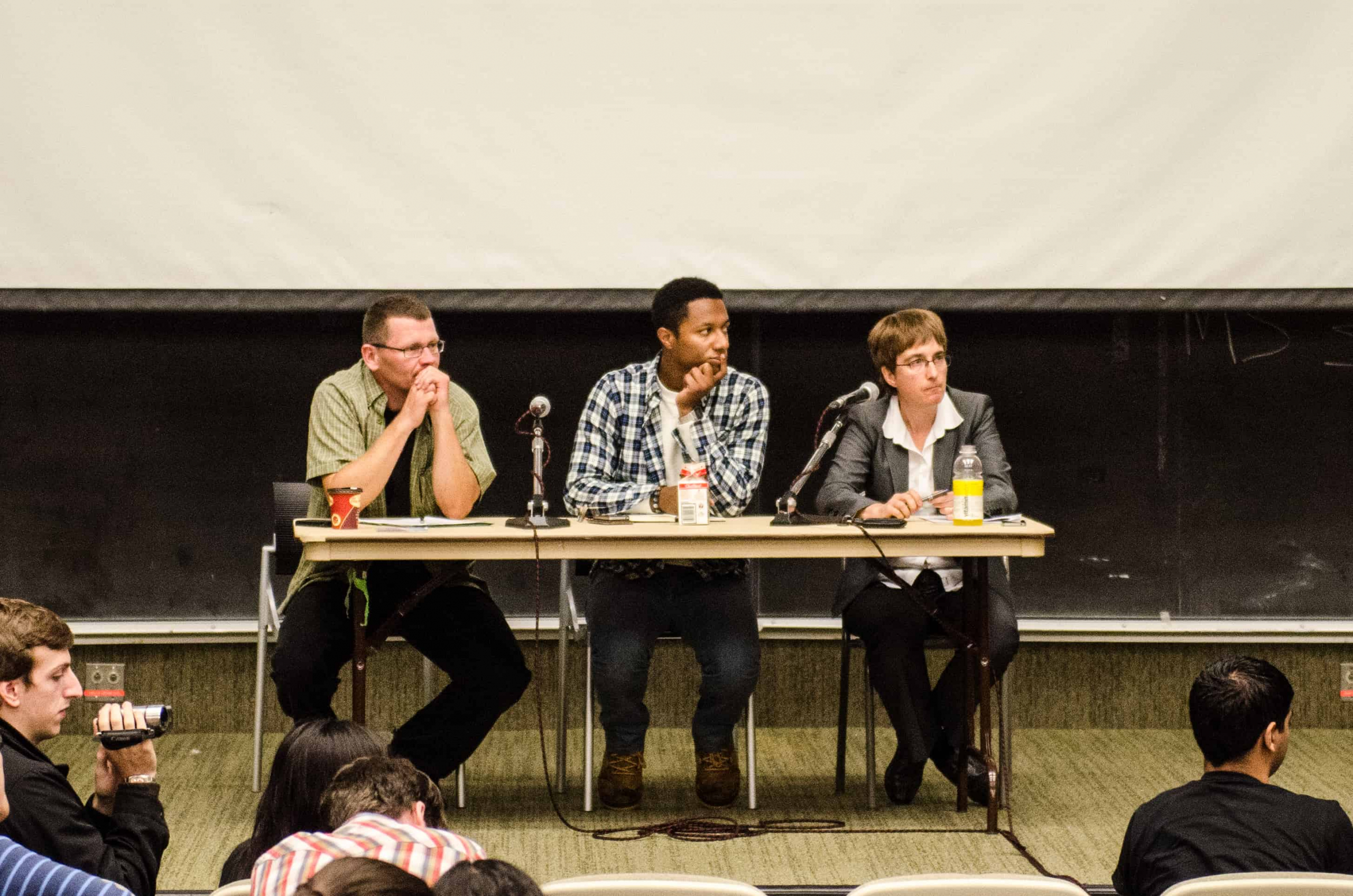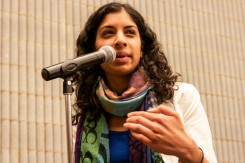UPDATED: Bolded sections of this article added Monday, October 5 to reflect new comments from the Ministry of Training, Colleges and Universities.
The University of Toronto Students’ Union (UTSU) hosted an emergency town hall on education Tuesday in the McLeod Auditorium. UTSU president Shaun Shepherd, U of T provost Cheryl Misak, and University of Toronto Faculty of Association (UTFA) president Scott Prudham led the discussion, with UTSU vice president-university affairs Munib Sajjad moderating.
The “emergency” at hand: the Ontario government’s 24-page discussion paper, “Strengthening Ontario’s Centres of Creativity, Innovation, and Knowledge.” Released in June by Minister for Training, Colleges and Universities Glen Murray, the paper suggests changes to post-secondary education in the province “the likes of which haven’t been seen in over 60 years,” according to a UTSU pamphlet advertising the town hall.
The discussion paper proposes three-year degrees, year-round classes with three full semesters per year, standardized first- and second-year courses across Ontario, and the movement of up to 60 per cent of undergraduate courses online. The paper closely resembles another proposal known as the “3-cubed” discussion paper leaked in 2011.
The UTSU will synthesize the opinions expressed during the town hall into an official written submission to the Ministry of Training, Colleges and Universities. The ministry is accepting institutional and individual input on the discussion paper until September 30.
In an email to The Varsity, Alvin Tedjo, senior communications advisor at the Ministry of Training, Colleges and Universities, said that the government would “develop options on how best to proceed” once the final reports were submitted.
Tedjo said the next round of analysis would include assessments of affordability, student competencies, content and critical thinking skills upon graduation, and “support for more self-directed and online learning.”
Murray initially planned to attend the event, but reversed that decision after his office was informed by the UTSU that he would not be permitted to speak. Murray’s office had not responded to a request for comment as of The Varsity’s press time. During his opening remarks, Shepherd said that Murray had been in contact with the UTSU about the town hall since July, but because he was the last potential speaker to confirm his attendance he was only invited as a “guest.”
Tejdo said that Glen Murray was invited to the event on September 10th and accepted the invitation ten days later, on the 20th. According to Tedjo, the UTSU withdrew the invitation for Murray to speak on September 22nd and Murray said he would not attend on the 24th, the day before the event.
Murray spent that Tuesday night at a government caucus, and met with eight other university officials.
There were unconfirmed reports that the minister would instead be meeting with college and campus leaders of the St. George Roundtable (SGRT) within the next two weeks.
No date has been set, although Jonathan Scott, president of the U of T Liberals and an organizer of the future meeting said Saturday that the Arts & Science Student Union (ASSU) and Association of Part-time Undergraduate Students (APUS) would be invited to join the SGRT at the meeting. “The UTSU is more than welcome to come,” said Scott “so long as they leave the bullhorns and belligerence at home.”
During his opening remarks, Shepherd said he did not want the panelists to take up speaking time intended for students to express their opinions about the paper. Despite concerns about speaking time, the meeting began with a satirical trivia game.
Panelists and speakers were broadly critical of the discussion paper. “This paper contains some pretty bad proposals for undergraduate education,” said provost Cheryl Misak, “but in each of these proposals, there is a good side.
“My task is to bring out the good side of the government’s proposals and make our students better off, without imperilling the integrity of their degrees and their futures,” added Misak.
While the provost criticized the proposal for three-year undergraduate degrees, she alluded to an optional program in which students could do their degrees in five years, divided between a three-year bachelor’s degree and a two-year masters. These so-called “fast track” degrees are already in development.
Misak also previewed an agreement — announced later the same week — that makes it easier to transfer credits between a consortium of seven Ontario universities.
In an email to The Varsity, Misak confirmed that the university was preparing its own submission letter to the Ministry. The letter would not be made public “out of courtesy for the process the Minister put in place.”
“We will respond to the discussion paper, as requested,” Misak confirmed. “We have many avenues for dialogue with the Ministry of Training, Colleges and Universities including regular meetings through COU [Council of Ontario Universities] and other discussions with the Ministry.”
Faculty association president Scott Prudham criticized the proposal’s apparent lack of concern for research, as well as the absence of any mention of academic freedom. Prudham was skeptical of the paper’s call for greater “productivity” in the post-secondary sector, which, Prudham and other speakers explained, has already been forced to do more with less. Prudham also slammed the paper for adopting a view of universities as factory-like institutions for training future workers.
“It’s good news that the minister has asked for input,” Prudham said, “but bad news, because he really needs it.”
Gathered students and staff, numbering around 100, were given an hour and a half to comment on the proposal. Topics of discussion ranged from transfer credits to summer employment, to class sizes and physical and mental health at Ontario universities.
Most of the students at the event were generally critical of at least some proposals in the discussion paper, though there was a range of opinions expressed.
The proposals of provost Misak received vocal support among a number of speakers. Other suggestions included using money potentially saved from online courses to fund seminar classes.
Some students, like human biology-major Shanice Chen, came undecided, hoping to learn more about the suggested changes. “I’m indecisive at the moment,” said Chen. “I wanted to be more informed about what the proposals are, and what we can do to stop them if we don’t like them.”
The auditorium was filled to about half capacity, and proceedings remained civil for the most part. Sajjad was criticized on social media for his reprimand of Michael Scott, a former UTSU director who was critical of the union’s handling minister Glen Murray’s speaking engagement.
Sajjad interrupted Scott, but allowed him finish his point. Despite Sajjad’s warning to the audience after Scott’s remarks that discussion was to focus solely the discussion paper, Guled Arale, vice president-external for the Scarborough Campus Students’ Union, was permitted to speak over his time limit about a previous consultation that Murray had attended.
According to Arale, Murray recently visited a similar town hall event at UTSC. The minister was supposed to address the crowd for five minutes at the end of the presentation, but instead spoke for nearly forty minutes after apparent confusion on the part of his staff.
After Murray was finished speaking, Arale said, there was only time for three students to ask questions. Murray’s office was unavailable for comment on the UTSC town hall.
With files from James Maiangowi.




